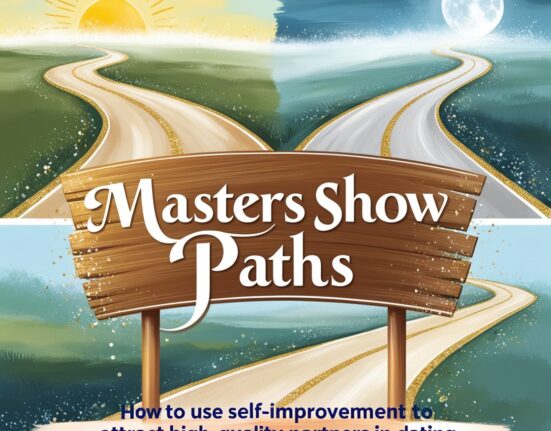What does it mean to have a fulfilling romantic life? Is it finding the perfect partner, going on romantic getaways, or having endless deep conversations over candlelit dinners? While all these experiences can enrich a relationship, the foundation of a truly fulfilling romantic life starts with an often-overlooked aspect: self-improvement.
The journey to building a deeply satisfying romantic relationship doesn’t begin with finding the right person but rather with becoming the right person—someone who is emotionally intelligent, self-aware, and committed to continuous growth. Here’s how you can leverage self-improvement to not only attract a meaningful connection but also maintain and nurture it for the long haul.
1. Self-Awareness: The Cornerstone of Meaningful Relationships
Self-improvement begins with self-awareness. Understanding who you are, what you value, and what you need in a relationship is crucial to finding and maintaining a fulfilling romantic life. When you take the time to reflect on your own desires, strengths, and areas for growth, you bring a more authentic version of yourself into any relationship.
Many people enter relationships hoping to find someone who completes them or makes them happy. But the reality is, you are responsible for your own happiness. When you cultivate self-awareness, you stop looking for someone to fill a void and start seeking a partner who complements you. This shift in mindset changes the dynamics of your relationships from dependency to interdependency—a much healthier foundation for love to flourish.
2. Emotional Intelligence: The Secret to Connection and Compassion
Emotional intelligence (EQ) is a game-changer in romantic relationships. It involves the ability to recognize, understand, and manage your own emotions, as well as empathize with your partner’s feelings. High EQ is correlated with healthier communication, deeper empathy, and a more compassionate approach to resolving conflicts.
Developing emotional intelligence through self-improvement can help you navigate the complexities of relationships with greater ease. It teaches you to pause before reacting, to listen actively, and to approach disagreements with a solution-oriented mindset. Imagine a relationship where both partners understand each other’s triggers and are committed to responding with kindness rather than defensiveness—that’s the power of emotional intelligence in action.
3. Cultivating Confidence Through Self-Improvement
Confidence is one of the most attractive qualities in a person, but it doesn’t come from a place of arrogance or superiority. True confidence is rooted in self-acceptance and self-love. When you engage in self-improvement, whether it’s through developing a new skill, pursuing a passion, or enhancing your physical and mental well-being, you naturally build confidence.
A confident person knows their worth and doesn’t settle for less than they deserve. This sense of self-assuredness allows you to set healthy boundaries, express your needs without fear, and walk away from situations that don’t serve your best interests. In romantic relationships, this translates to healthier dynamics where both partners feel valued and respected.
4. Personal Growth Fuels Mutual Growth
When you commit to self-improvement, you’re not just benefiting yourself—you’re also contributing to the growth of your relationship. A fulfilling romantic life isn’t just about personal happiness but also about building a partnership where both individuals feel inspired to grow together.
If you’re constantly evolving, learning, and striving to be a better version of yourself, you naturally encourage your partner to do the same. This mutual growth creates a dynamic where both partners feel supported and challenged to reach their full potential. Relationships that prioritize personal growth tend to be more resilient, adaptable, and fulfilling.
5. Self-Care and Well-Being: The Foundation of a Healthy Relationship
It’s easy to lose yourself in a relationship, especially when you’re deeply in love. However, maintaining a sense of self is essential to long-term happiness. Self-improvement involves practicing self-care—both physically and emotionally. Whether it’s through regular exercise, meditation, journaling, or simply setting aside time to relax, self-care helps you recharge and maintain a positive outlook.
When you’re at your best, you’re better equipped to handle the demands of a relationship. You show up as a more balanced, present, and loving partner. On the other hand, neglecting self-care can lead to burnout, resentment, and emotional fatigue, which can strain even the strongest relationships. Prioritizing your well-being is not selfish; it’s necessary for sustaining a healthy and fulfilling romantic life.
6. Communication Skills: The Lifeline of Any Relationship
Effective communication is the lifeblood of any successful relationship. Many relationship issues stem from miscommunication, unmet expectations, or an inability to express needs and desires clearly. Self-improvement in the realm of communication involves learning how to articulate your thoughts effectively, listen actively, and approach conversations with empathy.
For instance, instead of saying, “You never listen to me,” a more constructive approach might be, “I feel unheard when we have conversations about important topics.” This way of communicating focuses on feelings rather than accusations and opens up a dialogue rather than a defense. When both partners work on improving their communication skills, they create a safe space where both feel valued, understood, and respected.
7. Self-Improvement Leads to Better Conflict Resolution
Conflict is inevitable in any relationship, but how you handle it can make all the difference between a relationship that thrives and one that crumbles. Self-improvement in conflict resolution means developing patience, empathy, and the ability to see things from your partner’s perspective.
By working on your emotional regulation and communication skills, you learn to approach conflicts as opportunities for growth rather than threats to your relationship. A person committed to self-improvement understands that it’s not about winning an argument but about finding common ground and strengthening the bond.
8. Attracting the Right Partner Through Self-Improvement
The law of attraction is often talked about in the realm of self-help, but it holds significant weight in relationships too. When you focus on self-improvement, you naturally attract partners who are also committed to growth and self-betterment. You begin to draw in those who value your qualities and align with your values.
If you want a partner who is emotionally mature, driven, and compassionate, it makes sense to embody these qualities yourself. The energy you put out into the world often determines the kind of energy you attract back. By investing in yourself, you set the standard for the type of relationship you want to create.
9. Self-Improvement Encourages Gratitude and Appreciation
When you’re actively working on becoming a better version of yourself, you’re more likely to appreciate the effort your partner is putting into the relationship. Self-improvement fosters a sense of gratitude, not just for the big gestures but for the small, everyday actions that keep the relationship strong.
This gratitude encourages a positive feedback loop. When both partners feel appreciated and valued, they’re more motivated to continue investing in the relationship. A fulfilling romantic life thrives on mutual appreciation, where both individuals recognize and celebrate each other’s growth and efforts.
10. Becoming Whole Before Finding Your Half
One of the biggest myths about relationships is the idea that you need someone to “complete” you. A fulfilling romantic life is not about finding your other half but about being whole on your own and finding someone who complements that wholeness.
Through self-improvement, you learn to fulfill your own needs, find joy in your own company, and build a life that you love—whether you’re in a relationship or not. When you enter a relationship from this place of completeness, you’re not seeking validation or fulfillment from your partner. Instead, you’re looking to share your already full and rich life with someone who adds value to it.
Final Thoughts: Building a Fulfilling Romantic Life Through Self-Improvement
Self-improvement is not a one-time task; it’s a lifelong journey that enhances every aspect of your life, including your romantic relationships. By focusing on becoming the best version of yourself, you create the foundation for a deeply fulfilling romantic life—one that is based on mutual respect, growth, empathy, and love.
So, what steps are you taking toward self-improvement? How has personal growth impacted your romantic relationships? Share your thoughts, experiences, and insights in the comments below. Let’s engage in a meaningful conversation about the role of self-improvement in creating lasting love and fulfilling connections!



















